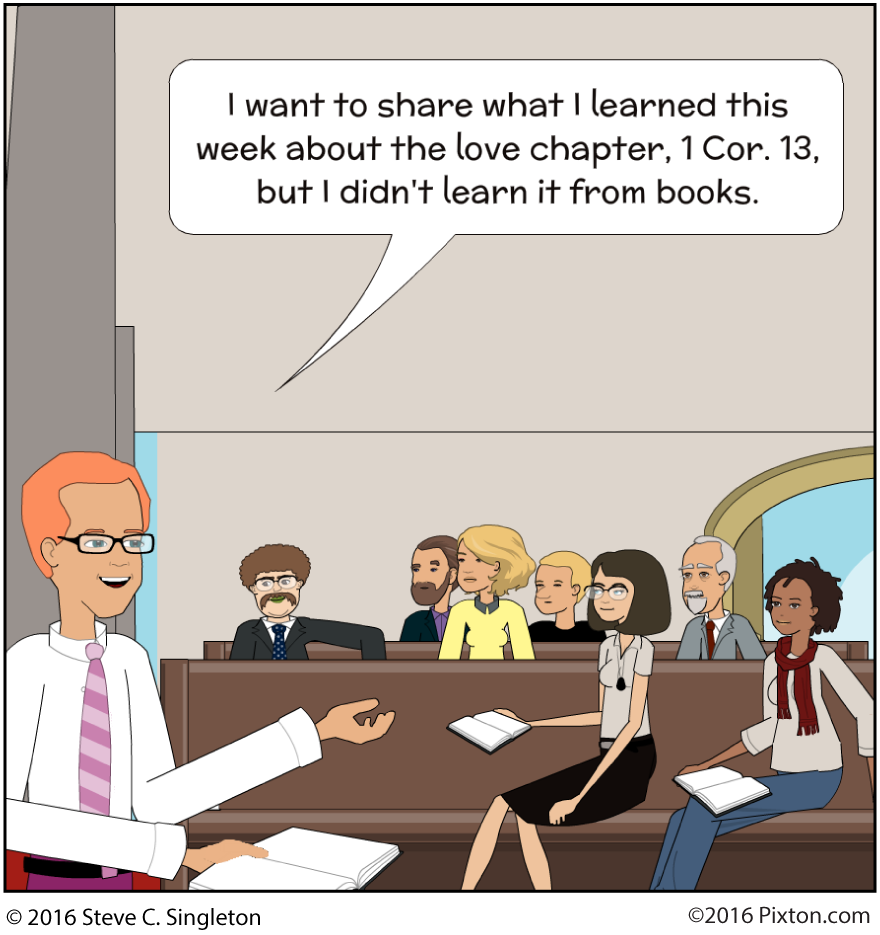The world is our classroom and God our teacher
Paul’s master portrait of Love
We call First Corinthians 13 the love chapter because it has the longest extended discussion of love anywhere in the Bible. The apostle Paul, who felt the sting of the Corinthians’ criticism that he was not an eloquent speaker, has written in only a few words one of the most eloquent descriptions of love found in all of human literature. Writing to a church that needed love’s lessons as the remedy for their many spiritual problems, Paul paints his master portrait with carefully chosen terms and phrases to address specifically what they were doing wrong.
Two approaches to studying 1 Cor. 13
A deeper study of this chapter could involve a careful analysis of the context, an examination of Paul’s use of rhetoric, a diachronic assessment of the major terms that occur, and a review of several crucial parallel passages. Modern Bible students have the benefit of being able to access the scholarship of generations of professors, exegetes, and language experts. We can also read and study the journal articles written over the past century by scores of scholars from all over the world. Yet we should remember to keep our eyes and ears open to the lessons we can learn from our daily experience as citizens of the world.
Love’s absolutes
You may have noticed in reading First Corinthians 13, that most of Paul’s description in vv. 4-8a is couched in absolute terms:
Love is patient, love is kind.
It does not envy, it does not boast, it is not proud.
It is not rude, it is not self-seeking, it is not easily angered, it keeps no record of wrongs.
Love does not delight in evil but rejoices with the truth.
It always protects, always trusts, always hopes, always perseveres.
Love never fails.
Like other examples of Pauline admonishment, e.g., 1 Thess. 5:16-18, Paul leaves no wiggle room for any of us to say, “I did pretty well. I tried.” As Yoda says, “Do or don’t do! There is no ‘try.’” We find ourselves falling short of these absolutes again and again, day after day, year after year. At the very moment when we are trying to understand the meaning of love, we find ourselves being impatient, unkind, envious, and proud. “Shut up!” we scream at our kids. “I’m trying to read this article about how to be loving.”
The classroom of life
God puts us into the classroom of life, and why should we be surprised? That is where he trained Israel his son, according to Deuteronomy 8:2-5:
Remember how the Lord your God led you all the way in the desert these 40 years, to humble you and to test you in order to know what was in your heart, whether or not you would keep his commands. He humbled you, causing you to hunger and then feeding you with manna, which neither you nor your fathers had known, and to teach you that man does not live on bread alone but on every word that comes from the mouth of the Lord. Your close did not wear out and your feet did not swell during these 40 years. No then in your heart that is a man disciplines his son, so the Lord your God disciplines you.
Jesus also spent time in that same classroom, according to Hebrews 5:8-9:
Although he was a son, he learned obedience from what he suffered and, once made perfect, he became the source of eternal salvation for all who obey him….
Other members of the class include Abraham, Sarah, Isaac, Rebekah, Jacob, Leah, Joseph, Moses, Joshua, Gideon, Samson, Samuel, Saul, David, Jonathan, Hosea, Isaiah, Daniel, Ezekiel, Nehemiah, Peter, Paul, Barnabas, John, Priscilla, and Timothy. (I’m thinking of how God taught them, not by direct revelations, but by life’s experiences.)
Some lessons don’t come from a book. They come to us when we experience the challenge of trying to live for the Master. The lessons we learn when we are successful, and even when we fail, are the lessons we probably will never forget. Like the long line of alumni from this classroom of life, we must learn the humility to say, “Have Thine own way, Lord, have Thine own way. Thou art the Potter, I am the clay.”






